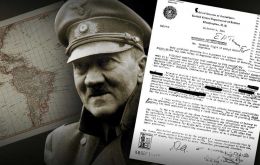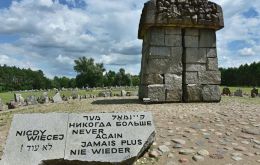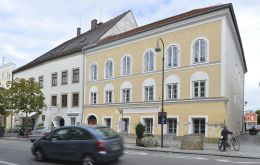MercoPress. South Atlantic News Agency
Tag: Nazis
-
Thursday, September 4th 2025 - 10:27 UTC
Argentine authorities given painting stolen during WWII

Argentina's Federal Police on Wednesday took delivery of the painting “Portrait of a Lady” by Giuseppe Ghislandi, which had been stolen by the Nazis in the Netherlands during World War II. The work of art, dating back to 1710, was voluntarily handed over by the family in possession of it for decades.
-
Tuesday, April 29th 2025 - 09:52 UTC
Argentina releases Nazi-related documents online

Argentina's General Archives (AGN) made available some 1,850 documents regarding Nazi activities in the country, including the presence of Josef Mengele, Erich Priebke and Adolf Eichmann. These files can now be accessed online at argentina.gob.ar/interior/archivo-general and include intelligence reports, photographs, and police records. Until now, the documents could only be accessed on site at the AGN headquarters.
-
Tuesday, March 25th 2025 - 09:07 UTC
Milei orders declassifying Nazi and military dictatorship files

Argentine President Javier Milei announced Monday two significant declassification initiatives. First, at the request of US Senator Steve Daines, he ordered the release of all official documents related to Nazis who sought refuge in Argentina after World War II, Cabinet Chief Guillermo Francos confirmed. These files, primarily held by the Defense Ministry, include financial records and their release would end decades of secrecy.
-
Monday, July 25th 2022 - 08:47 UTC
July 1942: Nazi Germany begins the systematic extermination of Polish Jews

In July 1942, Nazi Germany ordered the systematic extermination of the Jewish population in the Polish capital of Warsaw. Jews had been confined to the Warsaw Ghetto from November 1940, life was terrible. In the Ghetto to the northwest of the city some 450,000 men, women, and children lived crammed together behind the high walls. Around 100,000 people had died of hunger or disease, or been killed in summary executions. But the worse was to come on 22 July 1942.
-
Wednesday, June 3rd 2020 - 08:30 UTC
Austria is turning Hitler's house into a police station, hoping to neutralize neo Nazi attraction

Austria presented an architectural plan on Tuesday to turn the house where Adolf Hitler was born into a police station in the hope of “neutralizing” the space and ensuring it does not attract neo-Nazis.
-
Thursday, May 21st 2020 - 08:49 UTC
Controversy in Argentina over a new bank bill with the image of a brilliant doctor with Nazi connections

Argentina's Jewish community has expressed outrage at the decision to print a banknote bearing the likeness of a doctor who expressed support for Nazi ideology and even backed Josef Mengele's experiments on Jewish prisoners in Auschwitz.
-
Thursday, March 5th 2020 - 08:59 UTC
A list of 12.000 Nazis in Argentina with accounts in Credit Suisse has surfaced, confirms Simon Wiesenthal Center

A research by Argentine investigator Pedro Filipuzzi revealed a list of 12,000 Nazis in Argentina that apparently have money in accounts at the Zurich-based Credit Suisse investment bank, the Simon Wiesenthal Center said in a statement.
-
Tuesday, September 17th 2019 - 09:39 UTC
UN apologizes to Spain: Nazis bombed Guernica, not the Republican forces

The United Nations has apologized to Spain for having mistakenly attributed the devastating 1937 bombing of the town of Guernica to Spanish Republican forces, a spokesman said on Monday.
-
Monday, November 5th 2018 - 08:30 UTC
Soccer and the Holocaust exhibit in Argentina awarded German football tolerance prize

The German soccer federation is giving an award for tolerance for an Argentine exhibition of harrowing stories about soccer from the Holocaust era. The 11-panel exhibit — one for each soccer player on the field — tells the stories of teams and sportsmen who suffered under the Nazis.
